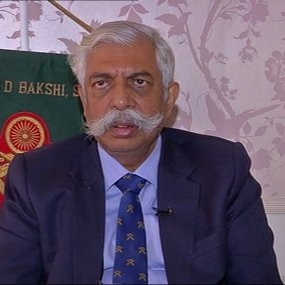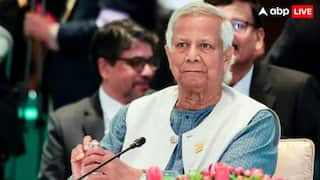Explorer
You have seen him on TV, but who is Gen GD Bakshi?

Major General Gagandeep Bakshi (retd) is possibly India’s most famous thinking and talking military veteran, certainly the most popular with the resurgent nationalists. Author of several well-researched books on military strategy, he is best known for his forceful articulation of the national interest on prime time news on several channels.
A man of versatile talents, he is currently engaged in producing a 19-episode series on India’s wars and battles, beginning with 1965 – the first war that India won after the disasters of 1947-48 and 1962. He is also helping to produce movies and comics on Param Vir Chakra and Ashok Chakra winners, which can be popularised on YouTube and become household names among the youth. As a trustee of the Netaji Bose INA Trust, he is working to reinvigorate the ethic of nationalism among the youth, and has penned a powerful biography of Netaji and the feats of the Azad Hind Fauj which, he believes, did much to help India achieve freedom.
Interestingly, Maj Gen GD Bakshi became an Army man in defiance of his family. His father, SP Bakshi, was Chief Education Officer of the Jammu & Kashmir State Forces (6 J&K Rifles) and a personal tutor to the then Yuvraj Karan Singh. When the State forces were merged with the Indian Army, he was sent to the Corps of Signals, from where he retired. His elder son, Srishthi Raman Bakshi, joined the 6 J&K Rifles (affectionately called the ‘family regiment’) in 1963, and at the tender age of 23 years was killed in a mine blast in the 1965 war (24 September 1965).
For the Bakshi family, the IAS was now the chosen destination for their surviving son, an alumnus of the 147-year-old St Aloysius School, Jabalpur, Madhya Pradesh. But young Gagandeep quietly filled the form for the National Defence Academy and came second in the All India Merit List. He joined as an Air Force cadet in June 1967, but on being told that he might not be allowed to graduate into a fighter pilot on account of not-so-perfect vision, switched to the Army. He was in the Indian Military Academy in 1971, when war clouds loomed. The training ended one month early and the cadets were dispatched to Siliguri. Bakshi was commissioned into 6 J&K Rifles and sent to the China front, from where attack was feared, before being deployed with the Mukti Bahini.
Fifteen years later, during a posting in Punjab (1985-87), he got his first exposure to domestic terrorism while commanding Sikh soldiers to fight Sikh militants. It was a delicate situation, but Bakshi candidly told them that Pakistan was using the community for its own nefarious ends, and won their loyalty and support. Soon the fracas of Operation Brasstacks was upon them (1987) and they were rushed to the border before de-escalation took place. He was then engaged in border sealing, to stop gold and arms smuggling into Punjab.
His talent recognised, he was soon posted to the Military Operations Directorate, the apex planning body for all military operations and supervised directly by the Chief and Vice Chief of Army Staff. They planned the Indian Peace Keeping Force operations in Sri Lanka. When one battalion lost too many men, a colonel of the regiment advised that the only way to overcome the defeat was to do well in combat. As problems emerged in J&K once again, he asked to be sent to Siachen.
Now a Lt Colonel, he volunteered to be posted at Kaksar in Kargil in 1987, five kilometres from the Line of Control, where a massive intrusion had taken place, but was not publicised. The Pakistanis enjoyed the heights and were harassing the men. The unit posted before 6 J&K Rifles, lasted eleven months and saw 48 soldiers killed and over a hundred wounded. Bakshi’s unit served its full tenure of two years, an incredibly tough posting where they could be supplied only on moonless nights and could not move an inch by day. The morale of the troops can be imagined.
Itching to respond, rather than continue to be sitting ducks, Bakshi persuaded the new General Officer Commanding, Gen OP Kaushik, and Corps Commander Zaki, of the need to act. They decided to stop the supplies to the Pakistani side by blocking the Burzul Pass while keeping their own supply line going via the Zojila Pass. Then they moved an Artillery regiment and fired the Pakistani positions with 105 mm guns, 120 mm heavy mortars, 81 mm mortars, rockets and so on. Intelligence reports later put the Pakistani casualties at 45 killed and 145 wounded; India lost 6 soldiers and 21 were wounded. The firing was so intense that 29 Baluch raised the white flag and Pakistan General Headquarters asked for a ceasefire.
Bakshi received a Vishisht Seva Medal, but was denied the next rank as peace talks took priority in New Delhi. This was still the age when every bullet had to be accounted for, which is why the forces secretly applauded when Union Home Minister Rajnath Singh recently asserted that India does not count bullets under fire.
It took one year for Bakshi to receive the full rank of Colonel, 6 J&K Rifles. By this time he had acquired a solid reputation in the Army and was posted as Instructor at the Staff College, Wellington, Ooty, a very prestigious posting. He then returned to the Military Operations Directorate in time to plan Operation Vijay (Kargil, 1999), for which he received the Chief’s Commendation Card.
Thereafter he volunteered to be posted to Jammu & Kashmir’s toughest counter-terrorism sector, Kishtwar, where he served in the Rashtriya Rifles for 27 months, during which period several top terrorist commanders were eliminated. At Kishtwar, the Army organised village defence committees, but found that the volunteers would be killed in lonely places, making life difficult. The Army responded with flame-throwers on the terrorists’ hideouts and from September 2001 onwards, civilian killings died out and the migrating population returned, which is no mean feat. He received the Sena Medal for his efforts.
GD Bakshi was now nominated to study at the National Defence College, as a Brigadier. He was then sent to the Northern Command Udhampur as First Brigadier-General Staff Information Warfare, a sensitive operation involving psy-ops. Then, with Rajouri Poonch in flames, he volunteered for the Romeo Force, Operation Sarpvinash, where General HS Lidder of 9 Para Commandos (the unit involved in the recent surgical strikes) led the action to ferret out terrorists scattered in villages. As many as 108 top terrorist leaders were killed and the area stabilised.
But now, the new Chief of Army Staff, Gen Deepak Kapoor, shunted him off to the Eastern Command. He returned to teach at the National Defence College, Delhi, in 2006, a position from which he superannuated when not promoted as ‘peace talks’ were again the flavour of Lutyens's Delhi and ‘war-mongers’ were unwelcome.
A thinking soldier, he devoted retirement to academics, doing his PhD on military history, which was published as Limited Wars in South Asia. His enduring contribution, however, is The Rise of Indian Military Power: Evolution of an Indian Strategic Culture (2010), which traces India’s military culture from the Vedas to the post-independence wars. In all, he has penned 35 books and 2 novels. Three poetry collections emerged as the best way to pass time on lonely postings, between battles and skirmishes. He briefly joined the Vivekananda International Foundation as deputy director to the then director, Ajit Doval, before moving on to a more multifaceted and diverse trajectory.
Disclaimer: The opinions, beliefs and views expressed by the various authors and forum participants on this website are personal and do not reflect the opinions, beliefs and views of ABP News Network Pvt Ltd.
Follow Blog News on ABP Live for more latest stories and trending topics. Watch breaking news and top headlines online on ABP News LIVE TV
View More



























